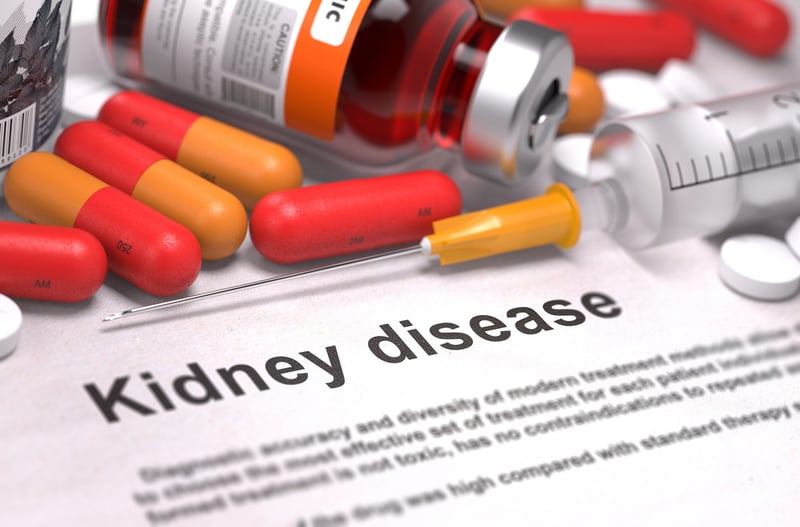
Facing kidney disease can be overwhelming, but you don’t have to do it alone. Imagine having a clear, personalized plan that not only helps manage your condition but also fits seamlessly into your life.
That’s where Medical Nutrition Therapy (MNT) comes in—an approach that’s as practical as it is powerful. At OnPoint Nutrition, our dedicated online nutritionists are here to guide you through every step, offering the expertise and compassion you need to take control of your health and reclaim your quality of life.
Dive into this article to discover how MNT can be your strongest ally in managing kidney disease.
Understanding Kidney Disease
Kidney disease refers to a variety of conditions that impair kidney function, including chronic kidney disease (CKD) and acute kidney injury (AKI). Understanding the nature of these conditions is crucial for early detection and effective management, which can significantly improve outcomes and quality of life.
Symptoms of Kidney Disease
Recognizing the symptoms of kidney disease is essential for early intervention. By familiarizing yourself with these symptoms, you can take proactive steps toward seeking medical advice and getting the care you need.
Common signs to watch for include:
- Fatigue: Feeling unusually tired or weak, even after adequate rest, can be an early indicator of kidney problems.
- Swelling: Kidneys help regulate fluid balance, so swelling in the legs, ankles, or face could signal a dysfunction.
- Changes in Urine Output: Noticeable changes in the frequency, color, or amount of urine—such as foamy urine or frequent nighttime urination—may indicate kidney issues.
Causes of Kidney Disease
Understanding the causes of kidney disease can help you take preventive measures or manage existing conditions more effectively. Key causes include:
- Diabetes: High blood sugar levels can damage the blood vessels in your kidneys over time, leading to CKD.
- High Blood Pressure: Uncontrolled hypertension puts extra strain on the kidneys, potentially leading to chronic kidney disease.
- Genetics: A family history of kidney disease can increase your risk, making regular check-ups and preventive care crucial.
The Benefits of MNT for Kidney Disease
Facing kidney disease can be overwhelming, but you don’t have to navigate it alone. Imagine having a personalized plan that not only helps you manage your condition but also fits seamlessly into your daily life. That’s where Medical Nutrition Therapy (MNT) comes in—an approach that’s both practical and empowering.
MNT can play a crucial role in managing kidney disease by fostering healthy eating habits that support kidney function and alleviate symptoms. Thoughtful dietary adjustments, such as reducing sodium, phosphorus, and potassium intake, can significantly ease the strain on your kidneys and help prevent further damage. These essential changes don’t have to feel restrictive or daunting. With the right guidance, you can enjoy a varied, satisfying diet while safeguarding your health.
Here’s how MNT can make a meaningful difference in managing kidney disease:
- Slowing Disease Progression: Learn how a well-balanced diet can slow the progression of kidney disease and help prevent additional damage.
- Symptom Management: Discover how proper nutrition can effectively manage symptoms and enhance your quality of life.
- Nutrient Balance: Understand the critical role of maintaining a balanced intake of essential nutrients to support your kidney health.
Key Components of a Kidney-Friendly Diet
An effective Medical Nutrition Therapy (MNT) plan for kidney disease is thoughtfully designed to include specific dietary components that support kidney function and help alleviate symptoms. By focusing on key areas of your diet, you can make meaningful changes that promote better health and quality of life.
Here’s what a well-crafted MNT plan for kidney disease might include:
- Low Sodium: Reducing sodium intake is crucial for managing blood pressure and preventing fluid retention, both of which are essential for maintaining kidney health. Learn how lowering sodium can help ease the strain on your kidneys and contribute to overall well-being.
- Protein Management: While protein is an essential nutrient, managing its intake is key for those with kidney disease. By carefully controlling the amount and type of protein you consume, you can reduce the workload on your kidneys, helping to slow the progression of the disease. Discover how to find the right balance for your needs.
- Potassium and Phosphorus: Potassium and phosphorus are two minerals that play significant roles in kidney health. However, when levels are too high, they can cause complications. Understanding how to maintain balanced levels of these minerals through dietary choices is vital for supporting your kidney function and preventing further issues.
The Role of an Online Nutritionist
Implementing and sticking to a Medical Nutrition Therapy (MNT) plan for kidney disease can be challenging, but having the right support makes all the difference. An online nutritionist offers the expertise, guidance, and encouragement you need to successfully navigate this journey, ensuring that your plan is not only effective but also sustainable in your daily life.
An online nutritionist can support you in managing kidney disease by providing:
- Customized Nutrition Plans: One size doesn’t fit all, especially when it comes to managing kidney disease. An online nutritionist will work with you to develop a personalized nutrition plan that takes into account your unique health needs, preferences, and goals. This tailored approach ensures that your diet supports your kidney function while fitting seamlessly into your lifestyle.
- Ongoing Monitoring: Consistency is key in managing kidney disease, and regular monitoring helps keep you on track. With ongoing check-ins, your nutritionist can track your progress, make necessary adjustments to your plan, and address any concerns that arise. This continuous support ensures that your MNT plan evolves with your needs, helping you achieve the best possible outcomes.
- Expert Guidance: Navigating kidney disease can feel overwhelming, but with expert advice from your nutritionist, you’ll have a clear path forward. From dietary changes to lifestyle adjustments and even supplements, your nutritionist will provide you with the knowledge and strategies needed to manage your condition effectively. This guidance empowers you to make informed decisions and take control of your health with confidence.
Working With a Nutritionist
Living with kidney disease can be a daily challenge, but you don’t have to face it alone. Medical Nutrition Therapy is more than just a dietary plan—it’s a lifeline that can significantly improve your quality of life.
With the personalized guidance of an online nutritionist, you’ll have the support you need to create a plan tailored specifically to your unique needs and goals. This isn’t about a one-size-fits-all solution; it’s about finding what works best for you, easing the burden on your kidneys, and reducing the risk of complications that can impact your well-being.Imagine having a compassionate expert by your side, helping you navigate the complexities of kidney disease with confidence. Your nutritionist will work closely with you, providing the knowledge, encouragement, and accountability that make lasting changes possible. They’ll be there to celebrate your successes, help you overcome obstacles, and adjust your plan as your needs evolve.If you’re ready to reclaim control over your kidney health and start making positive, lasting changes, now is the time to take that step. Schedule a consultation with OnPoint Nutrition today, and embark on a journey toward better health with the care and expertise you deserve.
Your path to a healthier, more fulfilling life starts here.
Topics

With a knack for turning complex nutrition facts into engaging, relatable content, she’s on a mission to make healthy living fun and accessible. Backed by a stellar team of Dietitians and Nutritionists, Abby breathes life into OnPoint’s mission, inspiring others to embrace the transformative power of good nutrition. Her infectious enthusiasm and innovative approach make her a driving force in the journey towards better health for all.




